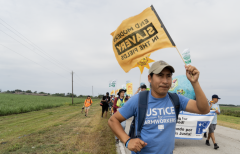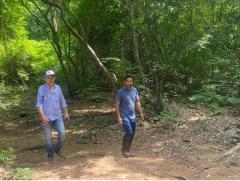In Guatemala and Honduras, corrupt officials in executive branches and legislatures are putting into place laws and policies to limit oversight and action by judicial authorities, human rights defenders, civil society activists, and journalists to expose and protest abuses, while sweeping away obstacles to their own corruption.
As the situation deteriorates rapidly, the White House focus on migration is almost exclusively driving U.S. government diplomacy towards the two countries, as well as towards El Salvador. U.S. aid for violence prevention, opportunities for youth at risk, and rural poverty reduction was suspended, and while the release of some $140 million in aid was announced in October 2019, most appears to be redirected towards implementing migration accords and strengthening borders. Programs to improve justice systems, expand civil society anti-corruption efforts, prevent violence, and protect LGBTQ+ rights have been slashed. Concern for corruption and rights violations is largely sidelined —even though corruption and rights violations are some of the very drivers of forced migration from the region.
Guatemala: Searching for Institutions to Weaken
Guatemalan President Jimmy Morales ended the mandate of the International Commission against Impunity in Guatemala (CICIG), the UN agency that had successfully uprooted corruption, indicted a president and vice president, and prosecuted corrupt politicians, former presidents, drug traffickers, and judges. In the process, it strengthened the Guatemalan judiciary’s capacity and resolve and offered hope for the nation’s future. CICIG closed its doors on September 3, 2019.
As President Morales ends his term at the end of this year, he and corrupt members of Guatemala’s legislature appear to be trying to ensure their own protection from exposure and prosecution. Now that CICIG is shut down, they are turning their attention to remaining obstacles in their way.
Attacking people and institutions protecting human rights:
- · Members of the Guatemalan Congress have mounted an attack on Jordán Rodas Andrade, the Guatemalan government’s outspoken human rights ombudsman, whose agency is one of the few recourses for Guatemalan citizens seeking protection from abuse or denouncing government corruption and neglect. These members of Congress are organizing an initiative to recall Rodas and withholding the ombudsman’s office budget. Mr. Rodas is under threat and has received protective measures from the Inter-American Commission on Human Rights.
- · President Morales issued a two-month “state of siege” in 22 municipalities in a disproportional response to the killing of three soldiers in one municipality. While now lifted, the state of siege limited freedoms and made it difficult for community leaders, human rights and humanitarian 2 organizations to carry out their work in those municipalities, which are characterized by conflicts between indigenous communities and mining and other large-scale extractive projects.
- · High-level government officials have placed human rights defenders in danger through intimidating speeches. For example, President Morales publicly labeled human rights activists “pseudo human rights defenders” in a September 4th speech announcing the state of siege.
- · Members of Congress have actually installed a commission to investigate CICIG, opening the door to intimidation against Guatemalan prosecutors and judicial personnel who collaborated with CICIG to combat corruption and human rights violations. While the Constitutional Court ruled against the establishment of this anti-CICIG commission, members of the Congress continue to hold hearings investigating CICIG.
- · A law regarding nongovernmental organizations that would increase regulations over NGOs and empower the Public Ministry to shut down NGOs for vaguely-defined actions against the public order is nearing approval in the legislature.
Reducing penalties for/making it more difficult to prosecute abusers:
- · The Guatemalan Congress voted to make changes to the penal code that considerably reduced penalties for corruption, bribery, money laundering, and some other crimes. The original bill would have introduced plea bargaining, allowing prosecutors to go after higher-level perpetrators by encouraging suspects to provide information in returned for reduced sentences. But the final bill allows corrupt officials to receive sharply lower penalties merely by admitting to the crime without providing information.
- · Despite the Guatemalan Constitutional Court ordering the withdrawal of a blanket amnesty law for crimes committed during the conflict, bill 5377, which would shield human rights abusers from prosecution and set war criminals free, members of the Guatemalan Congress continue to try to advance this bill through the legislature.
- · Proposals have been floated to reorganize the Attorney General’s office, such as a proposal to divide into three parts the Human Rights Prosecutor’s Office, which could weaken this important unit which investigates attacks against human rights defenders, trade unions, and journalists as well as other human rights violations. There are concerns as well for the continuation of the strong work of the Prosecutor’s Office against Impunity (FECI), which collaborated with CICIG, given the withdrawal of CICIG and the attacks against its record.
Situation of human rights defenders and journalists
In the context of this assault on rights and protections, Guatemala’s community leaders, human rights defenders, and journalists—as well as honest judges and prosecutors—are at increasing risk. Some prominent human rights advocates and judicial officials have sought exile abroad. The Guatemalan nongovernmental group UDEFEGUA has registered 402 aggressions against human rights defenders from January through September 2019, including 14 murders, 9 incidents of torture, and 277 incidents criminalizing human rights defenders. Twenty-six defenders were killed in 2018.
To mention only several of the latest killings, Diana Isabel Juarez, coordinator of a parish environmental ministry in Suchitepequez, was shot to death on September 7, 2019 by assassins in a passing car. Indigenous human rights defender Paulina Cruz Ruiz, a Maya Achi' ancestral authority, was shot to death 3 on September 14 in Rabinal, Baja Verapaz when four men opened fire. On November 6, Manuel Perez Hernández, a member of the Community of Campesino Development (CODECA) in San Pedro Pinula, Jalapa, was killed by men who entered his home and opened fire as he held his two-month-old baby in his arms.
Guatemala ranks 116 out of 176 countries in 2018 in terms of press freedom, according to Reporters without Borders, which notes, “Exposing political or administrative corruption and embezzlement can lead to threats and physical violence.”
Situation of women’s organizations & LGBTQ+ community
Women’s organizations have been affected by threats and attacks, including a series of break-ins into their offices. Efforts to move forward on protections against gender-based violence have been stymied, including by cutbacks to funding for centers of attention to women survivors (Centros de Apoyo Integral para Mujeres Sobrevientos de Violencia), which are NGO-run but receive government funding. LGBTQ+ persons face violence, with 22 LBTQ+ persons murdered in 2018. LGBTQ+ activists face growing societal attacks. A bill, the Law to Protect Life and the Family (5272), which would outlaw abortion even in cases of rape and potentially criminalize women suffering miscarriages, and which would expressly prohibit same-sex marriage, is being considered by the legislature. U.S. support for LGBTQ+ rights in Guatemala in terms of diplomatic statements and assistance programs has notably diminished under the Trump Administration. Some programs directed towards LGBTQ+ persons were cut prior to the general aid freeze.
U.S. policy towards Guatemala
In a positive move, on December 3, 2019, the State Department announced it was barring a former housing minister from the United States for “significant acts of corruption.” But while the U.S. government has long been a champion of CICIG’s anti-corruption efforts and enforcement of the Global Magnitsky Act continues, in the last year the diplomatic message against corruption and in support of human rights in Guatemala has been overshadowed by the emphasis on migration cooperation. Honduras: Corruption from the Top
A New York jury convicted Tony Hernández, the brother of Honduran President Juan Orlando Hernández, of drug trafficking on October 18, 2019. In the course of the trial, New York prosecutors labeled President Hernández “a co-conspirator,” presented evidence that he had received drug cartel money for his presidential campaign, revealed a web of drug connections to army and police officials, and denounced “state-sponsored drug trafficking.”
Yet the State Department stood by the Honduran government, declaring Honduras “a reliable ally.” A team of U.S. Department of Homeland Security and State Department officials arrived the very next week to hammer out an agreement—not on purging the government of corruption, but to establish Honduras as a “safe third country” so that the Trump Administration can stop Nicaraguans, Haitians, Cubans, and others from trying to claim asylum in the United States. The message was sent that the U.S. cares more about deporting asylum seekers than about corruption at the top.
Source: https://www.lawg.org/wp-content/uploads/LAWGEF-Guatemala-Honduras-memo-December-2019.pdf



